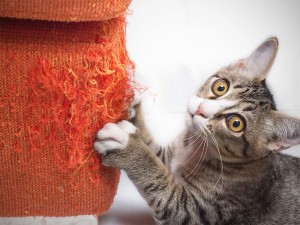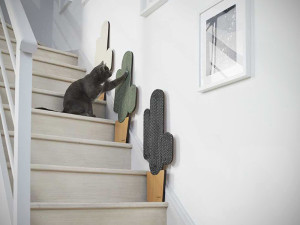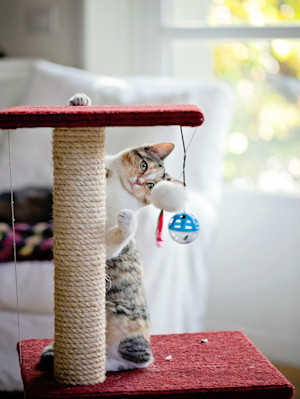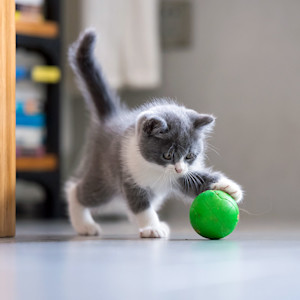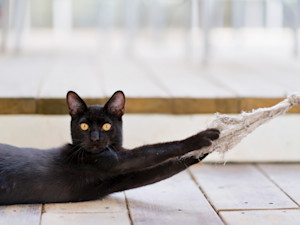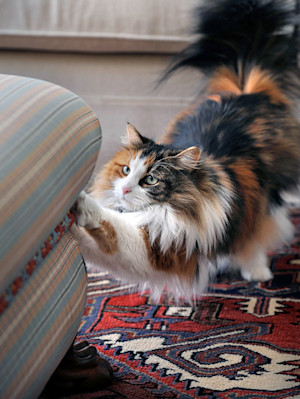Why is My Cat Scratching the Floor like Litter?
That’s a weird move, but OK.

Share Article
In This Article:
Why Do Cats Scratch the Floor? Instinctual Reasons For Floor Scratching Behavioral Reasons Health Concerns Related to Scratching How to Stop a Cat From Scratching the Floor
You walk into the room, and your cat is pawing at the floor with intense focus. There’s no litter box in sight, no obvious object to cover, yet they scratch away like they’re trying to bury something. Maybe it happens near their food bowl, or perhaps it’s in the middle of the hallway carpet. It leaves you wondering what they’re trying to accomplish.
Cats are famously mysterious creatures, and floor scratching is one of those behaviors that seems baffling at first. But for most cats, this action is tied to natural instincts, environmental cues, and specific motivations. Understanding why your cat is scratching the floor like litter can help you address the behavior if it becomes excessive or destructive.

Why do cats scratch the floor?
Cats scratch the floor for instinctual, behavioral, and environmental reasons. In most cases, it is not random. Cats are responding to internal drives or to something in their surroundings.
Instinctual drives
Cats are born with strong instincts to scratch, bury, and mark. Even domesticated cats retain these wild behaviors. Floor scratching often mimics natural burying or scent-marking behavior.
Behavioral patterns
Over time, cats develop routines and habits. If your cat frequently scratches the floor in a particular spot, they may have incorporated it into their daily pattern. Smells, textures, or past experiences can reinforce habits like this.
Environmental factors
Changes in your home, such as new surfaces, unfamiliar scents, or rearranged furniture, can trigger scratching. If your cat smells another animal in the house or has had their usual environment disrupted, they may respond by scratching to reclaim territory or restore comfort.
Instinctual reasons for floor scratching
Instinct plays a powerful role in this behavior. Even well-fed, indoor cats retain behaviors inherited from their wild ancestors.
Burying or hiding food
In the wild, cats often bury leftover food to avoid attracting predators or scavengers. If your cat scratches around their food dish after eating, they may be mimicking this behavior. Some cats even attempt to "bury" their full food bowl if they are not hungry.
Mimicking litter box behavior
Cats have a deeply ingrained instinct to dig and bury waste. This digging motion can spill over into other areas of the home, especially if the cat smells something they want to cover or remove. They may scratch near objects or scents they find unpleasant, trying to “bury” them as they would in a litter box.
Marking territory
Scratching is one of the ways cats mark their territory. They have scent glands in their paws, and when they scratch the floor, they leave both a physical mark and a scent marker.
According to Dr. Debra Horowitz, a board-certified animal behaviorist at VCA Animal Hospitals around the United States, “Scratching is largely a marking behavior that deposits scents from special glands on the cat’s paws into his territory, removing the translucent covering of the claws.”
This is a silent way of telling others, “This spot is mine.”
Nesting or preparing rest areas
Some cats scratch or paw at the floor before settling down. This nesting behavior is another instinctual pattern carried over from wild cats who would clear and prepare a space before sleeping. Even though your floors are already flat and clean, your cat may still feel the need to prepare their chosen resting place.
Behavioral reasons
While instinct is a major driver, some cats scratch the floor due to emotional or psychological reasons.
Seeking attention
If your cat notices that scratching the floor causes you to respond, whether with laughter, scolding, or moving them, they may repeat the behavior to get your attention. Cats are observant and will quickly connect actions with outcomes.
Boredom or lack of stimulation
A bored cat will find ways to entertain themselves. Floor-scratching can be a repetitive outlet for energy or curiosity. Cats who do not receive regular play or stimulation may create their own “games,” which sometimes involve obsessive behaviors like floor-scratching, chewing, or over-grooming.
Habitual behavior
Like pacing or nail-biting in humans, some cats develop floor scratching as a habitual behavior. They may start doing it in one specific spot or around certain times of day. Once established, habits like these can be hard to break without introducing other distractions or changes to their routine.
Stress or anxiety
Stress can trigger repetitive behaviors. A move, new pet, visitors, loud noises, or changes in routine may all cause your cat to act out through floor-scratching. This behavior provides a sense of control and can help them self-soothe. In anxious cats, you may see scratching paired with hiding, vocalizing, or changes in eating or litter box habits.
Health concerns related to scratching
In most cases, floor-scratching is harmless. However, if the behavior appears suddenly or becomes obsessive, it may be a sign that something else is going on.
A cat that seems to scratch compulsively or obsessively at floors, walls, or corners may be experiencing discomfort or neurological symptoms. In some cases, this behavior is linked to hyperesthesia syndrome, a rare but serious condition in which cats develop heightened sensitivity in their skin and nerves.
Floor-scratching that happens in connection with the litter box might also signal that your cat is dissatisfied with the box or has a medical condition like a urinary tract infection (UTI). If your cat seems to scratch around the box excessively, strains to urinate, or avoids using the litter box altogether, a vet check is necessary.
Persistent floor-scratching near food could be a sign of nausea or a dislike of the food. Cats sometimes “bury” food they find unappealing. If your cat is also showing signs of decreased appetite or vomiting, this may require investigation.
How to stop a cat from scratching the floor
Stopping this behavior starts with understanding the motivation behind it. Once you identify the reason, you can offer better outlets or remove the trigger.
Provide proper scratching surfaces
Make sure your cat has appropriate scratching posts, pads, or mats. Offer a variety of textures like cardboard, sisal, carpet, or wood. Place them in high-traffic areas or wherever your cat tends to scratch. Reward them when they use the appropriate surface.
Understand the trigger
Observe when and where your cat scratches. Is it always near the food bowl? Only at night? After visitors leave? These patterns can help you narrow down whether the behavior is instinctual, habitual, or stress-related.
Optimize litter box hygiene
If scratching seems to mimic litter box behavior, clean the litter box regularly and ensure it is located in a quiet, accessible spot. Try unscented litter and clean clumps daily. If the box is too small or too dirty, your cat may look for alternative ways to satisfy their digging and covering instinct.
Evaluate food and water placement
If your cat scratches near their food bowl, try moving the dish to a different location. Consider switching to a ceramic or stainless-steel bowl instead of plastic, which can retain odors. Feeding your cat on a mat that can be wiped down may help reduce their urge to bury leftover food.
Some cats do not like eating near water, litter boxes, or noisy areas. Experiment with bowl placement to see if it changes the behavior.
Consult a veterinarian
If the behavior becomes obsessive, escalates suddenly, or is paired with other symptoms like vomiting, weight loss, or hiding, a vet visit is recommended. Medical conditions or neurological issues could be at the root of the problem, and catching them early can prevent more serious health concerns.
Bottom line
Cats scratch the floor for many reasons. Most of the time, it is normal and harmless. They may be mimicking natural behaviors, expressing a need, or responding to something in their environment. With a little observation, you can usually figure out what your cat is trying to do or say through this behavior.
If floor scratching becomes excessive, destructive, or seems connected to illness or anxiety, don’t ignore it. Pay attention to patterns and respond by offering enrichment, adjusting their surroundings, or getting professional advice. What seems like a weird little quirk could be your cat’s way of asking for something they need. And with a few small changes, you can help them feel more secure, relaxed, and comfortable in their space.
References
Chan, Paola. “Scratch This, Not That.” Journal of the IAABC Foundation, https://journal.iaabcfoundation.org/scratch-this-not-that/opens in new tab.
Horwitz, Debra. “Cat Behavior Problems – Scratching Behavior.” VCA Animal Hospitals, https://vcahospitals.com/know-your-pet/cat-behavior-problems---scratching-behavioropens in new tab.
Salem, D. J., and A. N. Rowan, editors. The State of the Animals III: 2005. Columbia UP, 2005, https://www.wellbeingintlstudiesrepository.org/sota_2005/8/opens in new tab.

Valerie Mellema
Valerie Mellema has a Bachelor of Science in Agribusiness and Equine Industry from West Texas A&M University. She has been a professional writer for the past 20 years, covering a wide variety of pet health and care topics before founding a nonprofit focused on mental health in children and thoroughbred aftercare. She has four Border Collies and eight retired racehorses.
Related articles
![Grey cat sitting on on stairs scratching at the cactus shaped Meyou Paris Vegas Scratcher]()
The Best Cat Scratching Posts, Pads, and Everything in Between
Save your sofa.
![Cat playing with scratching post.]()
How to Train and Get Your Cat to Use a Scratching Post
You can stop your cat from scratching everything in sight.
![Small kitten playing with a rubber ball at home.]()
Cats Can’t Stand These Textures—They Have Very Sensitive Paws
It's not just crumpled tin foil.
![Woman training kitten at home.]()
How to Train a Kitten
Yes, it’s possible.
![A black cat holding onto a rope with its claws.]()
It’s Seriously Uncool to Declaw Your Cat
A cat veterinarian explains why the inhumane surgery is no joke.
![Naughty cat scratching couch at home.]()
How to Stop Cats From Scratching Furniture
Don’t they care that you saved for six months for that sofa?

